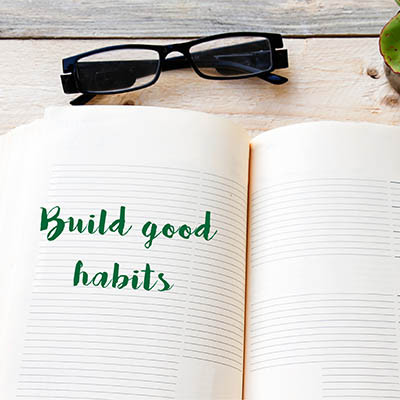Directive Blogs
Build Great Habits with These 3 Tips
As a business owner, we are sure that you have your fair share of day-to-day stressors. Oftentimes, these stressors can lead to the development of bad habits. When this happens, you might get the urge to correct the bad behavior and replace it with good, productive habits. That said, it’s easier said than done to build good habits, especially when you have so much else on your plate.
Still, building good habits can be paramount to developing yourself on both a personal and professional level, so it’s worth a shot to give it a try. Here are three tips for developing good habits that will actually stick with you for years to come.
Create a Schedule (and Stick to It)
If you don’t give yourself time to work on your new habit, it naturally will not become one. Schedule a little bit of time each and every day to work toward your new habit. We are sure you can carve out five minutes to floss or half an hour to read a book. You can also plug this into your calendar to give yourself notifications, if you are having trouble remembering.
You can start by easing your way into the goal by making it achievable. Even a little bit of progress is progress… in the beginning, at least. If you find that you are consistently hitting your deadlines/goals for this habit in the first week or so, you can try to expand it a little bit to offer more of a challenge. For example, if you want to write a little bit every day, maybe you start with 200 words, then gradually increase that amount over time. You can also get an accountability partner, or someone who can check in on your progress periodically. After all, it would be a shame to let them down, right?
Eliminate Resistance (or Add It)
Things that are easy to do are just that--easier to do. This means that, if you are trying to build a habit, doing so will be much easier if you make it easy to stick to. Let’s use someone who is trying to lose weight as an example. Keeping the freezer stocked with frozen vegetables will make healthy eating much easier than if it were stocked with pizza rolls or ice cream. For a more business-oriented example, let’s say you want to read more often. Keep an interesting book on your desk at work or your coffee table at home. Just having it out in the open will make you more likely to pick it up and read a bit.
On the other side of the coin, there is adding resistance, or making bad habits harder to stick to. To use the same example as above, you might simply keep sweets or other unhealthy foods out of the house; or, if you would like to keep some around, put them at the back of the cupboard where they are difficult to get to. For the reading example, you want to cut out other time-wasting activities. Put the television remote in a drawer or, if you are particularly bad about this, take the batteries out of it. This will make it much more difficult to actually participate in the bad behavior.
Reward Yourself for Sticking To It
While sticking to a habit that is good for you should be reward enough, let’s face it; some habits are not as attractive as others, despite being good for you. Going to the gym three times a week can be made more attractive if you give yourself a small reward for doing so. Reading a certain number of pages a week will be easier if you know that, after you are done, you can do something you enjoy afterward.
There is a fine line to walk here, though. You don’t want the rewards to turn into bad habits themselves. If you make the rewards too enticing, you might just skip the habit being built altogether and jump straight to the reward, which can be counterproductive to your goal of building a habit.
Bonus Tip: Try a 30 Day Challenge
If you aren’t confident in your ability to develop a habit in the long term, try committing to something more in the short-term. Try to stick to a habit for a minimum of 30 days and see how you do. Who knows? Maybe using the above tips, you will find that it’s not as hard as you think.
The important thing to remember is that true change takes time, so don’t get discouraged if you don’t see immediate results from your efforts. What are some good habits that you want to build? Let us know in the comments below.


